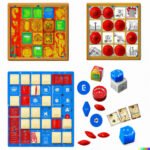The Book of Classic Board Games holds a special place in the hearts of many, tapping into nostalgia and the joy of friendly competition. From Chess to Monopoly, these games have stood the test of time, captivating players of all ages with their enduring appeal. In this article, we will dive into the history, popularity, and future prospects of classic board games.
Classic board games have a rich and fascinating history, with origins that can be traced back centuries. As we explore their evolution over time, it becomes clear that these games have played a significant role in shaping social interactions and leisure activities across different cultures. Understanding this historical context sheds light on why these games continue to hold such a prominent place in our lives today.
Despite the rise of digital entertainment, classic board games remain as popular as ever. Their ability to bring people together for hours of fun and strategic thinking is unmatched by any other form of entertainment. The reasons behind their timeless appeal are complex but undeniable, making them an essential part of our cultural fabric. In the following sections, we will delve deeper into what makes these games so beloved and how they continue to thrive in today’s society.
History of Classic Board Games
The history of classic board games dates back thousands of years, with some of the earliest known games being played in ancient civilizations such as Egypt and Mesopotamia. One of the oldest known board games is Senet, which was played in ancient Egypt around 3,000 BC. Over time, these early forms of board games evolved and spread to different cultures, eventually leading to the wide variety of games we know today.
Evolution of Popular Games
As societies continued to develop, so did their forms of entertainment. The popularity of classic board games continued to grow, with new games emerging throughout history. Chess, for example, has a rich history that dates back to the 6th century, originating in India before spreading to Persia and eventually Europe. Similarly, the game of Go has been played for over 2,500 years and is considered one of the most challenging strategic games ever created.
Influence on Society
Classic board games have had a significant impact on society over the centuries. They have been used to teach military strategy (such as in the case of chess), mathematics (backgammon), and negotiation skills (Monopoly). Additionally, classic board games have provided families and friends with hours of entertainment and bonding opportunities.
Today, many classic board games continue to thrive while also inspiring new iterations and adaptations. Their enduring appeal speaks volumes about their ability to captivate players across generations and cultures. By tracing the origins and evolution of popular classic board games, we gain a deeper appreciation for these timeless forms of entertainment that continue to enrich our lives today.
The Enduring Popularity of Classic Board Games
The appeal of classic board games has proven to be enduring, captivating players of all ages for generations. From the strategic challenges of chess to the unpredictable fun of snakes and ladders, these games continue to stand the test of time. There are several key reasons why classic board games remain popular among players of all ages.
Nostalgia
One significant factor contributing to the enduring popularity of classic board games is nostalgia. Many people have fond memories of playing these games with family and friends during their childhood. The sense of nostalgia associated with these games often prompts individuals to introduce them to their own children or enjoy them with friends, thereby keeping the tradition alive.
Simple Yet Engaging Gameplay
Classic board games are known for their simple yet engaging gameplay. Whether it’s racing around a board in Monopoly or strategically placing tiles in Scrabble, these games offer a level playing field for players of varying skill levels. The rules are easy to understand, allowing players to quickly dive into the action and have fun without feeling overwhelmed by complicated instructions.
Social Interaction
Another reason for the continued popularity of classic board games is the social interaction they promote. Unlike digital games played in isolation, classic board games encourage face-to-face interaction, communication, and bonding among players. Whether it’s sharing laughter over a funny move or strategizing together as a team, these social aspects make the experience more enjoyable and memorable for everyone involved.
The Book of Classic Board Games
Readers can expect to find detailed information about the history and evolution of each game, shedding light on how these timeless classics have shaped the world of board gaming. The Book of Classic Board Games also offers insights into the enduring popularity of these games, exploring why they continue to captivate players of all ages across different generations.
In addition to providing historical context, this comprehensive guide also includes practical tips for choosing the right classic board game. Factors such as player age, game complexity, and playing time are all taken into consideration to help readers make informed decisions when selecting a game to play. Whether you are a seasoned gamer or new to the world of board games, this book serves as an invaluable resource for discovering and rediscovering classic favorites.
| The Book | Classic Board Games |
|---|---|
| Comprehensive Guide | Beloved Games |
| Coverage of history and evolution | In-depth information about each game |
| Tips for choosing right classic board game | Factors considered for game selection |
Tips for Choosing the Right Classic Board Game for You
The Book of Classic Board Games offers a wide array of options for individuals looking to invest in a timeless form of entertainment. With so many classic board games to choose from, it can be overwhelming to decide which one is the right fit for you. When choosing a classic board game, there are several important factors to consider.
First and foremost, it’s essential to consider the number of players that will typically take part in your gaming sessions. Some classic board games are designed for two players, while others are better suited for larger groups. Additionally, think about the age range and skill level of the individuals who will be playing. Certain classic board games may be more suitable for children, while others may appeal more to adults or require a higher level of strategic thinking.
Another crucial factor to keep in mind when selecting a classic board game is the amount of time you have available for gameplay. Some games are quick and can be completed in 30 minutes or less, making them ideal for those with limited time on their hands. On the other hand, there are classic board games that require a longer time commitment and are better suited for dedicated game nights or weekends.
Lastly, think about your personal preferences and interests when choosing a classic board game. Whether you enjoy competitive gameplay, collaborative strategy, word-based challenges, or luck-based outcomes, there is undoubtedly a classic board game that will align with your tastes.
| Factors to Consider | Description |
|---|---|
| Number of Players | Consider the number of participants and their age/skill level. |
| Time Commitment | Think about how much time you have available for gameplay. |
| Personal Preference | Take into account your own interests and gaming style. |
How to Play
Playing classic board games can provide hours of entertainment and a great way to bond with family and friends. Whether it’s a competitive game of chess or a cooperative game like Pandemic, these timeless favorites offer something for everyone. Here are some detailed walkthroughs of the rules and strategies for some of the most iconic board games:
- Chess: Chess is a two-player strategy game that has been played for centuries. The objective is to checkmate your opponent’s king while protecting your own. Each piece moves in specific ways, and understanding their movement patterns is crucial to mastering the game.
- Monopoly: Monopoly is a classic real estate trading game that involves buying, renting, and selling properties to accumulate wealth while bankrupting your opponents. Understanding the importance of strategic purchases and managing your money is key to winning.
- Scrabble: Scrabble is a word game that challenges players to create words on a game board using letter tiles. Strategic placement of words can maximize points while minimizing opportunities for opponents.
These are just a few examples of the many classic board games that have been enjoyed by generations. With each game offering its unique set of rules and strategies, learning how to play them can be both challenging and rewarding. By understanding the intricacies of each game, players can elevate their skills and increase their chances of success during gameplay.
Whether you’re new to board gaming or looking to rediscover an old favorite, taking the time to learn the rules and strategies of classic board games can open up a world of fun and excitement for players of all ages.
The Social Benefits of Playing Classic Board Games
Classic board games have been a source of entertainment for centuries, but they also offer a wide array of social benefits that contribute to personal development and strong relationships. Here are some ways in which these games promote communication, teamwork, and problem-solving skills:
- Communication: Playing classic board games requires effective communication among players. Whether it’s negotiating trades in Monopoly, strategizing in chess, or cooperating with teammates in Scrabble, clear and concise communication is essential for success.
- Teamwork: Many classic board games involve teamwork and collaboration. Games like Pictionary and Codenames encourage players to work together to achieve a common goal, fostering a sense of unity and cooperation.
- Problem-Solving Skills: Classic board games often present players with complex challenges that require critical thinking and problem-solving skills. From devising a winning strategy in Risk to finding the best word combinations in Scrabble, these games encourage players to think analytically and creatively.
In addition to promoting these key social skills, classic board games also provide an opportunity for meaningful interaction without the distractions of technology. Whether it’s family game night or a gathering with friends, playing board games allows for face-to-face engagement and fosters deeper connections between individuals. These social benefits make classic board games not only a source of enjoyment but also a valuable tool for personal growth.
As society continues to embrace digital forms of entertainment, the enduring appeal of classic board games as a social activity demonstrates their timeless relevance. From childhood favorites to strategic masterpieces, these games provide countless opportunities for bonding, learning, and fun. As such, they are likely to remain an integral part of social interactions for generations to come.
The Future of Classic Board Games
In conclusion, while the digital age has brought about significant changes in how we entertain ourselves, classic board games continue to remain relevant and beloved by people of all ages. As technology continues to advance, there is potential for classic board games to integrate with digital platforms, creating new opportunities for growth and accessibility. The timeless appeal of these games lies in their ability to bring people together, encourage social interaction, and promote critical thinking skills.
The ongoing relevance of classic board games can also be attributed to the rising interest in nostalgia and the desire for more meaningful social interactions. In a world dominated by screens and constant connectivity, the tactile experience and face-to-face interaction offered by classic board games are becoming more valuable than ever.
People are seeking ways to disconnect from technology and engage in activities that provide a sense of connection and community, making classic board games an appealing choice for many.
As we look ahead into the future, it is clear that classic board games will continue to hold a special place in our culture. Whether through traditional tabletop play or innovative digital adaptations, these time-honored games have proven to withstand the test of time. As we navigate an increasingly digital world, the enduring appeal and adaptability of classic board games ensure they will remain an integral part of our entertainment landscape for generations to come.
Frequently Asked Questions
What Is the Main Classic Board Game?
The main classic board game is generally considered to be Chess. It is a strategic game with a long history, originating from India in the 6th century. The game has simple rules but complex strategies, making it a timeless favorite for players of all ages.
What Is the Oldest Known Board Game?
The oldest known board game is believed to be Senet, an ancient Egyptian game dating back to around 3100 BC. This two-player game involved strategy and luck, and was often used as a metaphor for the journey of the soul through the afterlife in Egyptian religious beliefs.
What Is the Rarest Board Game?
The rarest board game is often considered to be J.H. Singer’s 1895 “The Checkered Game of Life.”
This unique board game was only sold for a short period of time and there are believed to be very few remaining copies in existence today. It has become a sought-after collector’s item due to its rarity and historical significance in the development of modern board games.

I love playing all kinds of games – from classics like Monopoly to modern favourites like Ticket to Ride.
I created this blog as a way to share my love of board games with others, and provide information on the latest releases and news in the industry.





